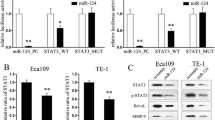Abstract
Esophageal cancer is one of the most common digestive system neoplasms and has a quite poor prognosis. TNF-related apoptosis-inducing ligand (TRAIL) induces the apoptosis in a wide range of cancer cells including esophageal cancers. However, TRAIL also activates apoptotic pathway in normal cells. To improve the specificity of TRAIL action, we employed the microRNA (miRNA) response elements (MREs) of miR-143 and miR-122 to restrict TRAIL expression mediated by an adenoviral vector (Ad-TRAIL-143-122) in esophageal cancer cells. The experiments showed that Ad-TRAIL-143-122 was able to highly express TRAIL in esophageal cancer cells, but not normal cells. The selective TRAIL expression also led to selective apoptosis in esophageal cancer cells. Ad-TRAIL-143-122 greatly reduced the viability of esophageal cancer cells without cytotoxicity to normal cells. In mice, Ad-TRAIL-143-122 suppressed the growth of esophageal cancer xenografts and protected liver from TRAIL-induced toxicity. In this study, we constructed a biologic vector that can express exogenous genes in a tumor-specific manner. This strategy can simultaneously treat cancer and prevent hepatoxicity and thus may be a promising way for esophageal cancer treatment.









Similar content being viewed by others
References
Enzinger PC, Mayer RJ. Esophageal cancer. N Engl J Med. 2003;349:2241–52.
Pan G, O’Rourke K, Chinnaiyan AM, Gentz R, Ebner R, Ni J, et al. The receptor for the cytotoxic ligand trail. Science. 1997;276:111–3.
Younes M, Georgakis GV, Rahmani M, Beer D, Younes A. Functional expression of trail receptors trail-r1 and trail-r2 in esophageal adenocarcinoma. Eur J Cancer. 2006;42:542–7.
Kondo K, Yamasaki S, Inoue N, Sugie T, Teratani N, Kan T, et al. Prospective antitumor effects of the combination of tumor necrosis factor-related apoptosis-inducing ligand (trail) and cisplatin against esophageal squamous cell carcinoma. Surg Today. 2006;36:966–74.
Kim SH, Kim K, Kwagh JG, Dicker DT, Herlyn M, Rustgi AK, et al. Death induction by recombinant native trail and its prevention by a caspase 9 inhibitor in primary human esophageal epithelial cells. J Biol Chem. 2004;279:40044–52.
Zheng SJ, Wang P, Tsabary G, Chen YH. Critical roles of trail in hepatic cell death and hepatic inflammation. J Clin Invest. 2004;113:58–64.
Bartel DP. MicroRNAs: genomics, biogenesis, mechanism, and function. Cell. 2004;116:281–97.
Croce CM, Calin GA. MiRNAs, cancer, and stem cell division. Cell. 2005;122:6–7.
Gu J, Wang Y, Wu X. MicroRNA in the pathogenesis and prognosis of esophageal cancer. Curr Pharm Des. 2013;19:1292–300.
Liu SG, Qin XG, Zhao BS, Qi B, Yao WJ, Wang TY, et al. Differential expression of miRNAs in esophageal cancer tissue. Oncol Lett. 2013;5:1639–42.
Wu BL, Xu LY, Du ZP, Liao LD, Zhang HF, Huang Q, et al. Li EM: miRNA profile in esophageal squamous cell carcinoma: downregulation of mir-143 and mir-145. World J Gastroenterol. 2011;17:79–88.
Liu R, Liao J, Yang M, Sheng J, Yang H, Wang Y, et al. The cluster of mir-143 and mir-145 affects the risk for esophageal squamous cell carcinoma through co-regulating fascin homolog 1. PLoS One. 2012;7:e33987.
Ni Y, Meng L, Wang L, Dong W, Shen H, Wang G, et al. MicroRNA-143 functions as a tumor suppressor in human esophageal squamous cell carcinoma. Gene. 2013;517:197–204.
Zhang W, Cai R, Luo J, Wang Y, Cui Q, Wei X, et al. The oncolytic adenovirus targeting to tert and rb pathway induced specific and potent anti-tumor efficacy in vitro and in vivo for hepatocellular carcinoma. Cancer Biol Ther. 2007;6:1726–32.
Liu J, Ma L, Li C, Zhang Z, Yang G, Zhang W. Tumor-targeting trail expression mediated by miRNA response elements suppressed growth of uveal melanoma cells. Mol Oncol. 2013;7:1043–55.
Bo Y, Guo G, Yao W. MiRNA-mediated tumor specific delivery of trail reduced glioma growth. J Neurooncol. 2013;112:27–37.
Zhao Y, Li Y, Wang L, Yang H, Wang Q, Qi H, et al. MicroRNA response elements-regulated trail expression shows specific survival-suppressing activity on bladder cancer. J Exp Clin Cancer Res. 2013;32:10.
Hu J, Xu Y, Hao J, Wang S, Li C, Meng S. Mir-122 in hepatic function and liver diseases. Protein Cell. 2012;3:364–71.
Ma L, Liu J, Shen J, Liu L, Wu J, Li W, et al. Expression of mir-122 mediated by adenoviral vector induces apoptosis and cell cycle arrest of cancer cells. Cancer Biol Ther. 2010;9:554–61.
Acknowledgments
This study was supported by The youth innovation fund of the First Affiliated Hospital of Zhengzhou University.
Conflicts of interest
None
Author information
Authors and Affiliations
Corresponding author
Rights and permissions
About this article
Cite this article
Zhou, K., Yan, Y. & Zhao, S. Esophageal cancer-selective expression of TRAIL mediated by MREs of miR-143 and miR-122 . Tumor Biol. 35, 5787–5795 (2014). https://doi.org/10.1007/s13277-014-1768-5
Received:
Accepted:
Published:
Issue Date:
DOI: https://doi.org/10.1007/s13277-014-1768-5




